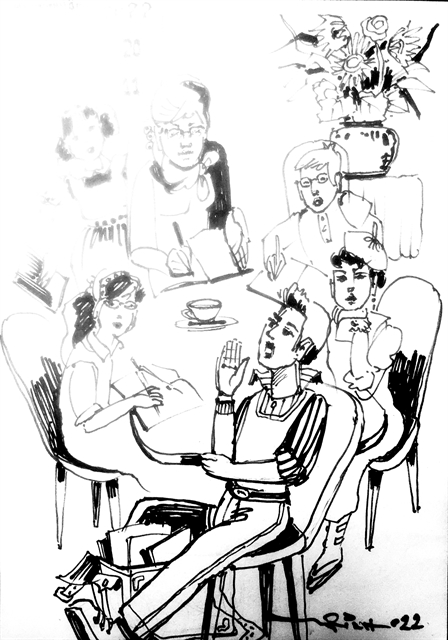 Talk Around Town
Talk Around Town

 |
| Illustration by Trịnh Lập |
by Nguyễn Mỹ Hà
A popular Vietnamese saying goes, “Muốn con hay chữ thì yêu lấy thày” - if you want your children to find joy and happiness in studying at school, you need to love their teachers.
Of all vocations, Việt Nam’s tradition places the utmost importance on two types of work that start with the word “thày”: teachers (thày giáo) and doctors (thày thuốc).
These masters have to work hard, with less remuneration and recognition. A German friend emailed to set up a meeting this Sunday, November 20, coinciding with Việt Nam’s Teachers’ Day, one of the most celebrated days in Việt Nam.
“I will be brief, as I shall have to visit my old teachers,” I said of an activity that was new to my friend.
It is natural for small children to love their primary school teachers, but for parents, it doesn't come naturally. It’s a work in progress; believe it or not, if you want your children to progress, parents and teachers must find a way to work together to steer their children in the right direction.
Over the past decade or more, a leading trend was for student-centred schools, creating an academic environment focused on student needs and desires. The roles of teachers somehow became less stressed upon or evaluated. Their work became more difficult with less recognition.
In public schools, where an excessive number of students have to fill up limited space, many teachers have to carry a small-sized loudspeaker at all times. The classroom noise makes it difficult to hear anyone. At home, you only have to listen to a few kids. Your children’s teachers must fight for a quiet moment with 40 or even more, who all need to be heard and understood.
In private schools, teachers have to cope with fussy parents who want to interfere with how their children are taught and trained. They put pressure on teachers and how they do their jobs. Some rich kids are, at times, disrespectful to their teachers.
In the media, you read about stories of teachers who became so hopeless they resorted to physical abuse of their students, leaving the parents to go into a rage and attack the teachers whom they were supposed to "love" as tradition dictates.
Understanding your children's teachers and putting yourself in their shoes may be better than trying to "love" them. Every day, in the parent-teachers report e-book, we see what happened when our kids were at school; their names were noted for not doing homework, for under-average grades, or their best grades or achievements.
As parents, we tend to like to hear about our kid's achievements and success more than anything else. Good news about our children's success at school tends to please our ears more and flatter our sense of success more than any other professional accolades.
Some of my rich friends decided to send their children to an international school because they did not want to hear about their children's shortcomings
"I hate to hear and see that the teachers have listed as my kid's wrongdoing in the Vietnamese school," one said.
I, for one, am no exception when it comes to helping our children learn and succeed at school. The only difference, I guess, is the attitude towards our children's try-but-fail efforts. Such shortcomings tell us much more about a child's character, attention span, skills, and effort than anything else.
During my child's primary school years, she was very frustrated she could not match her best friend, who got top marks in all subjects. In that situation, you cannot compete against a superhero kid, and can never win the race, so why bother to start it in the first place!
I believe a child's time at school is to try to figure out what they like and do not like, how to correct their own mistakes, learn the right way, and then to grow from there.
Trying to be in a child's shoes with an adult's point of view, I realised something which I later told my child, which is if you get top marks all the time, and never taste the sour bitterness of a lower grade, you'll never fully grasp the sweetness of a hard-earned success. Also, from a child's perspective, they learn more from their shortcomings.
Teachers' work is as challenging as ever. My children's teachers still sent class reports late at night, and if you have a question, they will help you find a solution. They will list your child as having unfinished homework but never stop encouraging your child to do better, work harder and notice even tiny changes in your child's growth, both physical and mental health.
Understanding their perspectives will gradually bridge the gap between the two sides. Parents and teachers share one common goal, to help children grow and teach them to become good people.
Thank you. It seems to be too polite a word to say on this special day. But thank you. Dear teachers, we are always grateful for your actions, for pointing out our children's mistakes, and for encouraging them to be better every day. We thank you for giving so much in a job that does not always give back.
We love you! VNS




